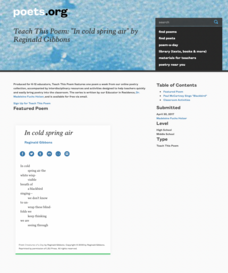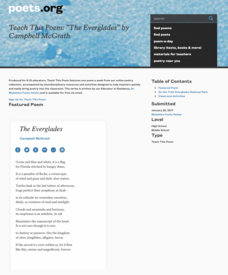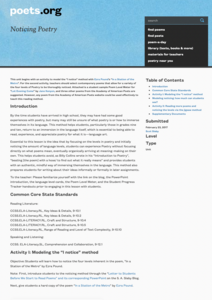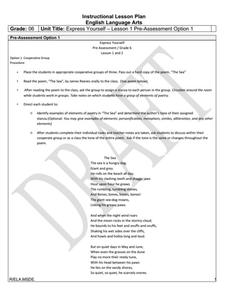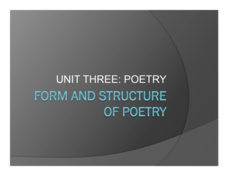EngageNY
Writing, Critique, and Revising: Two-Voice Poems (Chapter 14: "Las Ucas/Grapes")
Continue work on the two-piece poem that compares two characters from Esperanza Rising. Give class members a few minutes to finish their drafts. After they have a complete product, model how to critique and edit the poems with one group....
Curated OER
"Your Son, Your Only One" - The Sacrifice of Isaac as a Motif in Holocaust Poetry
Class groups examine a series of poems that use Abraham’s willingness to sacrifice Isaac as a motif in Holocaust poetry. Included are questions, notes to the teacher, and bibliographical information on each poem. The activities could be...
Academy of American Poets
Teach This Poem: “Making History” by Marilyn Nelson
What makes an event newsworthy, worth a reference in a news magazine or textbook? Who decides? These are questions Marilyn Nelson asks readers of her poem "Making History" to consider. To begin, class members list details they notice in...
Academy of American Poets
Teach This Poem: "On Being Brought from Africa to America" by Phillis Wheatley
Phillis Wheatley's poem, "On Being Brought from Africa to America" is the focus of a instructional activity that asks readers to consider how the poem is a critique of slavery. Groups comprise a list of words and phrases they notice as...
Academy of American Poets
Teach This Poem: "The Tradition" by Jericho Brown
To begin this lesson, class members examine Antonius Hockelmann's painting "Tree Flowers II," record elements of the painting that they notice, and share their observations with a partner. Next, pupils do a close reading of Jericho...
ReadWriteThink
What is Poetry? Contrasting Poetry and Prose
Introduce middle schoolers to the different strategies used when reading prose versus poetry. Groups use a Venn diagram and a poetry analysis handout to compare the characteristics of an informational text and a poem on the same subject...
Academy of American Poets
Teach This Poem: "Spring is like a perhaps hand" by E. E. Cummings
E. E. Cummings' "Spring is like a perhaps hand" offers young scholars an opportunity to try their hands at analyzing a simile. After a warm-up activity and a close reading of the poem, class members discuss what they think the poem is...
Academy of American Poets
Teach This Poem: "Tamales on Christmas" by Christian Robinson
A lesson spotlights the poem "Tamales on Christmas" by Christian Robinson. Scholars discuss their favorite foods and then examine a lively picture of a family preparing tamales. After listening to the poem twice, learners participate in...
Pixton Comics Inc.
Elements of an Epic
Mythic heroes, gods and goddesses, and epic tales come alive as young artists craft their own graphic novel or mind map for classic epics, including The Odyssey, Beowulf, Harry Potter, and Star Wars, identifying the six elements of every...
Academy of American Poets
Teach This Poem: “Dead Stars” by Ada Limón
Pay attention! A lesson featuring Ada Limon's poem "Dead Stars" is designed to help learners develop their noticing skills. Class members first study the constellation Orion's image and list what they notice and how the image makes them...
PBS
Discuss 22-year-old Amanda Gorman’s inaugural poem “The Hill We Climb”
Two poems by National Youth Poet Laureate Amanda Gorman are spotlighted in a PBS lesson. Young scholars conduct a close reading and watch videos of Gorman reading her inaugural poem "The Hill We Climb" and "The Miracle of Morning." They...
Digital Public Library of America
The Poetry of Emily Dickinson
Are you contemplating a poetry study featuring Emily Dickinson? Finding good primary sources to accompany the study can be a challenge—never fear, help is here! Check out this primary source set that includes manuscripts of several of...
Academy of American Poets
Teach This Poem: "In cold spring air" by Reginald Gibbons
Reginald Gibbons' poem "In cold spring air" provides learners with a chance to develop their noticing skills. As a warm-up, class members watch Paul McCartney's video singing "Blackbird" and note words and phrases that stand out. They...
Academy of American Poets
Teach This Poem: "Toward the Winter Solstice" by Timothy Steele
Timothy Steele's poem, "Toward the Winter Solstice," offers scholars an opportunity to consider what poets and scientists could learn from each other's work. First, learners examine a NASA image of a star-forming region in the Orion...
Academy of American Poets
Teach This Poem: "Maps" by Yesenia Montilla
After examining a physical map of the world, learners conduct a close reading of Yesenia Montilla's poem "Maps." They note the interesting words and phrases, the way the poem is structured, and list questions they might have. After...
Academy of American Poets
Teach This Poem: "Old South Meeting House" by January Gill O'Neil
The vaulted ceiling of the Old South Meeting House has heard many voices. Young scholars read an excerpt about its importance in American history and then do a close reading January Gill O'Neil's poem, "Old South Meeting House." After...
Academy of American Poets
Teach This Poem: "Imagine" by Kamilah Aisha Moon
A lesson about Kamilah Aisha Moon's poem "Imagine" asks young scholars to imagine, "What would happen if...?" If Dr. Martin Luther King's dream became a reality. If Renisha McBride was a white girl and crashed her car in a black...
Academy of American Poets
Teach This Poem: “The Everglades” by Campbell McGrath
Florida's Everglades come alive for young environmental scientists as they watch a video taken in the park and read a poem about the watery paradise. After a careful study of the two resources, class members consider the function of the...
Curated OER
Play with Powerful Poetry
Use stations to teach skills relevant to the Common Core and tap into individual creativity.
Academy of American Poets
Noticing Poetry
Introduce scholars to the "I Notice" method, a different approach to studying poetry. Instructors first model the noticing method by identifying words and images that appeal on the sonic level, the ideational level, the sensory level,...
Curated OER
"Music Be the Food of Love:" Found Poetry with Shakespeare and Hip-Hop
Lines from Shakespeare and from hip-hop artists provide learners with an opportunity to examine the literary devices these artists use to express their ideas about love. Groups use the provided lines to craft found poems, and then the...
Curated OER
Express Yourself Pre Assessment Lesson 1 & 2
Find out how much your class knows about literary elements with a quick pre-assessment. Pupils work first individually to identify the instances of personification, metaphor, simile, and more, and then with group members to determine the...
Springfield Public Schools District 186
Form and Structure of Poetry
If anyone suffers from metrophobia—the fear of poetry—the PowerPoint on the elements of poetry may help alleviate their worries. The presentation introduces learners to poetic elements, including simile, metaphor, and personification....
Curated OER
Deciphering the Mechanics of Poetry
After a review of poetic terms, groups are given an object and they create a poem using a simile, a metaphor, internal rhyme, end rhyme, alliteration, and personification. Groups then exchange objects and repeat the process. Consider...














